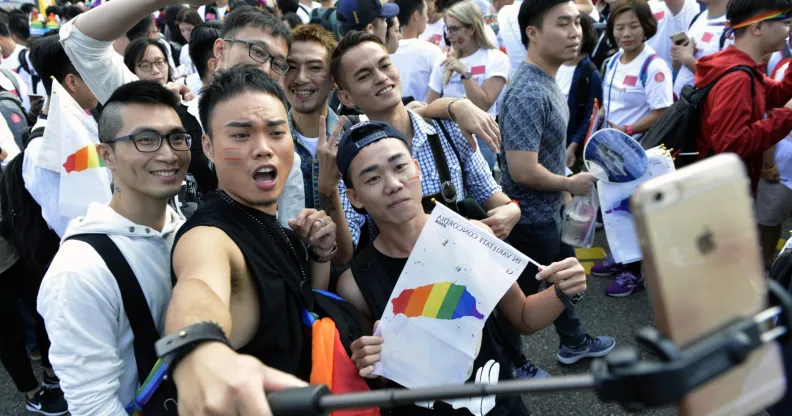Taiwan will be the next country to add a third gender to official documents

Supporters of same-sex rights take selfies during a gay pride parade in Taipei on October 28, 2017.
A welcome announcement has made Taiwan the latest country to add a third gender to their passports.
The measure, which was proposed by the country’s Gender Equality Committee (GEC), means that the country is
one step away from including an ‘x’ option on passports, pending approval from Ministry of the Interior (MOI).
As the legislation affects the inclusion of an ‘x’ on household registration and national ID cards, it will allow Taiwanese passport holders to also include a non-specified gender on their passport as well.
Taiwan has made wave a landmark LGBT-supporting nation in East Asia, as it became the first Asian country to order its parliament to legalise same-sex marriage.
But how does the rest of the globe measure up to Taiwan?

Where else in the world can you get a third gender passport?
Canada, Australia, Denmark, Germany, Malta, New Zealand, Pakistan, India, Ireland and Nepal have all introduced, or are in the process of introducing a third gender option on passports.
In spite of the fact it only introduced same-sex marriage at the beginning of this year, New Zealand became the first nation to introduce an ‘x’ passport option.
Germany’s constitutional court ruled in September 2017 that the nation must create and recognise an ‘x’ category on official documents, which made it the first country in Europe to legally recognise the third gender.
Canada became the 10th country to recognise the third gender on official documents.
However, in the UK there is still a legal battle to be had when it comes to the recognition of the third gender on legal documents.
Christie Elan-Cane, who identifies as non-gendered, is bringing a judicial review to the UK courts to have the right to choose a non-specified gender legalised.
“Legitimate identity is a fundamental human right but non-gendered people are often treated as though we have no rights,” Elan-Cane said.
“The UK’s passport application process requires applicants to declare whether they are male or female. It is inappropriate and wrong that someone who defines as neither should be forced to make that declaration.’’

